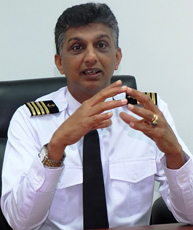Sri Lankan seafarers - the opportune moment
by Prof. Capt. Nalaka Jayakody
With the country being strategically positioned and blessed with an
abundance of resources and access to affordable first-class maritime
training, Sri Lanka needs to strive to leverage and be a top maritime
nation recognised for its quality seafarers. This will not only result
in increasing employment opportunities but also enhance and improve the
country's foreign remittances and living standards.
Maritime nation
|

Prof. (Capt.) Nalaka Jayakody |
I personally think that we are under-using resources in the country.
Despite having many offers from overseas I still stay back to give my
maximum contribution to develop the maritime sector. I have authored
articles which I believe are not controversial but thought-provoking
expert views. I believe it's my responsibility to address and make all
stakeholders aware of this. My focus primarily is on two areas -
maritime and academic. With experiences gained in over 90 countries, in
my opinion, Sri Lanka is blessed with resources unlike any other country
but unfortunately we haven't really harvested and nurtured it.
Dominant countries
From the time of Independence to successfully ending the civil war, I
haven't seen any focus on producing and promoting seafarers which is one
of the lucrative professions in the world today. It's a multi-million
dollar industry which demands the proper attention of authorities
through which Sri Lanka can benefit socially and financially.The entire
world depends on shipping as ninety percent of world trade is done by
ships. The worldwide population of seafarers serving on internationally
trading merchant ships (50,000) is estimated to be 1.2m, in the order of
470,000 officers and 730,000 ratings. The Western world used to be
important and dominant among crew supplying nations.
With the development of the maritime sector, the costs to maintain
ships and especially crew too considerably increased which made the
dominant countries look for maritime labour at low cost.
As a result, the shipping industry's crews were recruited mostly from
developing countries such as Philippines and India with many seafarers
having the opportunity to serve on foreign flagged ships. Since
recently, countries in Eastern Europe such as Ukraine, Croatia and
Latvia are experiencing a growth in supplying seafarers.About 30 percent
of seafarers are from the Philippines. Out of the 1.2m mariners in the
world, the Philippines is the top supplier of seafarers globally. Sri
Lanka can definitely be the next big supplier provided the authorities
extend due attention and concern regarding this.
Income
Though Sri Lanka is a maritime nation, we have only repaired or
patched-up ships so far and have not gone beyond that to leverage
resources to improve the sector and economic standards rather the
country has focused on preliminary options by sending the unskilled
abroad, mainly to the Middle East which does not generate significant or
considerable benefits to our country, socially or financially.
I believe in the saying "One seafarer sent to the sea equals a
hundred unskilled persons to the Middle East, in terms of income."
Once a seafarer joins and move up the career ladder, he or she would
be making seven digits in five or ten years even before the age of 30.
This should be an eye-opener for the authorities. Sri Lanka has a high
literacy rate and Sri Lankans' foreign language knowledge compared to
other countries is also high. It's also neutral with many nationalities
working and living together in harmony and peace unlike some countries
where there are issues within the border.
To be continued next week |

